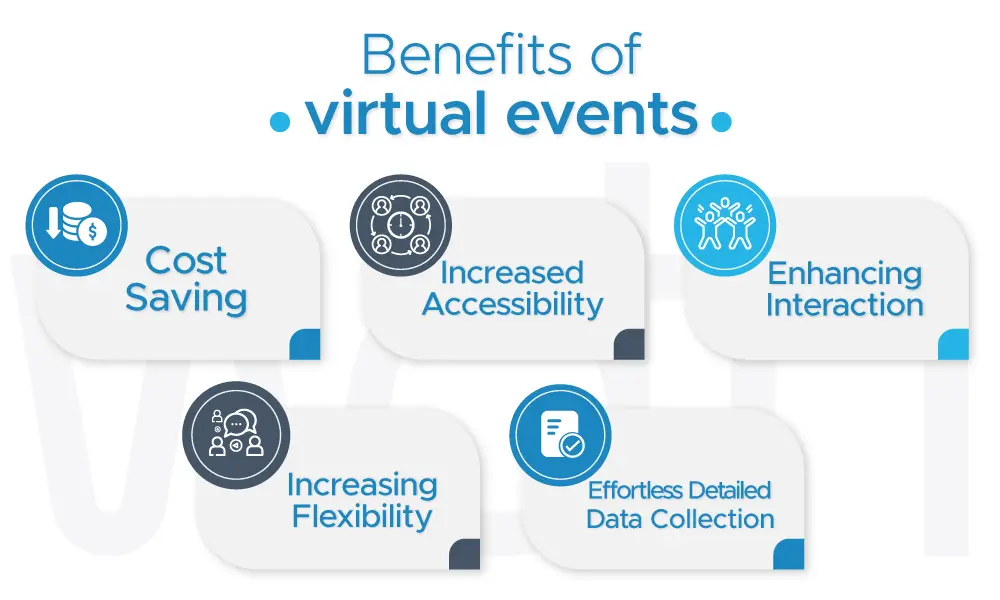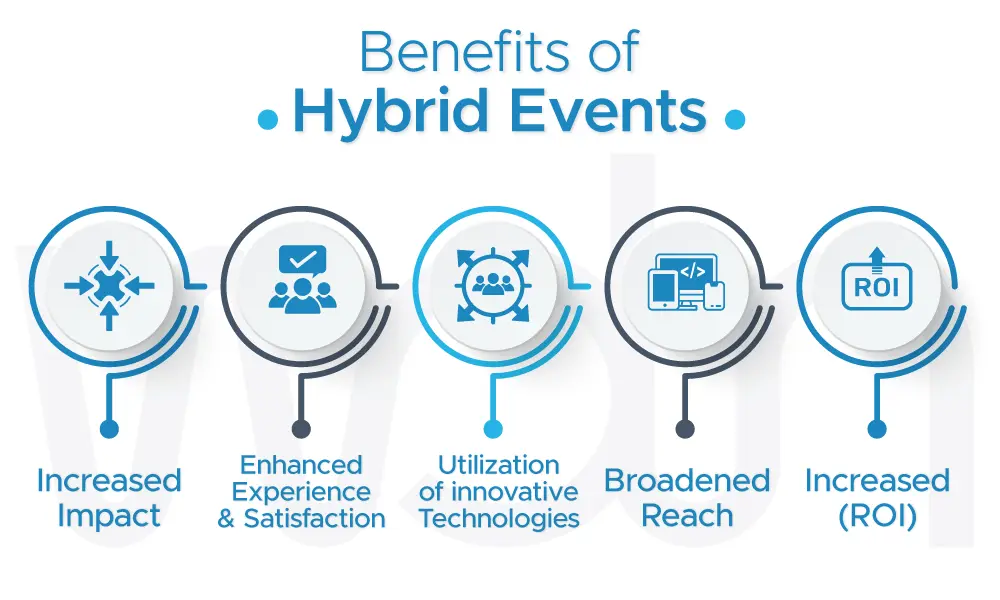Your Vision, Delivered
Say hello to the real experience!
Bring your next event to life—guided by experience, innovation, and excellence.
Let’s create together
Events have undergone a profound transformation in recent years. The progress of technology and the evolution of communication means have integrated virtual events and hybrid events as integral components of this shift. In this era of digitalization, we are now able to engage and communicate in unprecedented ways, enabling participants from across the globe to seamlessly join events through the online medium.
If you're looking for an effective and captivating audience experience, virtual and hybrid events present you with precisely that opportunity. Thanks to the latest advancements in event coordination, you can now provide a profoundly influential and widely accessible encounter, free from the limitations of time and location. Within this article, we will extensively explore the notable distinctions between virtual and hybrid events, meticulously examining the advantages and disadvantages of each category. This exploration will empower you to make a well-informed choice while strategizing your upcoming event. Furthermore, we will supply invaluable pointers and expert guidance to ensure that you orchestrate your event in a manner that optimizes its potential and aligns with the expectations of your target audience.
Virtual events offer a unique and distinct experience as they are entirely conducted over the internet, eliminating the need for physical presence of organizers, speakers, or attendees. Let's imagine you wish to participate in an international conference relevant to your field. However, due to financial or health-related reasons, you find it challenging to travel to the conference venue. Would you miss out on the valuable opportunity to learn and engage with experts and colleagues in your field? Certainly not. With technological advancements, you can now attend the conference online, watch sessions and presentations, and actively participate in discussions, questions, and polls.
Hybrid events exist at the crossroads between in-person and virtual gatherings. They feature an audience that convenes in a physical location, along with a virtual audience participating through the internet. By designing a hybrid event, your goal is to provide an interactive and realistic experience similar to both audiences, thereby fostering positive engagement and participation. Utilizing a suitable platform for this type of event, both physical attendees and digital participants can seamlessly merge into a unified experience and interact with each other throughout the event duration.
The popularity of virtual events has surged significantly in recent years, particularly following the emergence of the COVID-19 pandemic. From that point onward to the present, this form of gathering has gained immense favor. According to a 2022 report by Kaltura, 75% of event participants indicated a preference for virtual interactions. Given this context, let's delve into several advantages that virtual events can provide you.

Virtual events work to reduce expenses associated with travel, accommodation, venue rental, catering, and other costs linked to physical events. Instead of allocating substantial funds for reserving venues, equipment, and services, organizers can leverage cost-effective or even free digital platforms and tools to host professional and appealing events. Attendees can also save time and money that would otherwise be spent on commuting, lodging, and other personal expenses.
Virtual events offer increased both in terms of participant numbers and diversity. Anyone from anywhere in the world can easily and swiftly join without temporal or geographical constraints. Rather than limiting attendance due to distance, travel visas, or other commitments, individuals interested in the subject matter can register and join events with a simple click. Organizers can attract a larger and broader audience by utilizing electronic promotion and marketing methods.
This approach relies on technological tools and platforms that facilitate communication and interaction among participants, such as text chats, voice chats, voting, games, and more. Instead of relying on traditional interaction methods, attendees can utilize these tools to express their opinions, exchange feedback, and engage in direct discussions. These tools also allow for the collection and analysis of data regarding attendee interaction and satisfaction levels, aiding in improving the quality and effectiveness of events.
Virtual events offer multiple options for attendees, including viewing content live or recorded, selecting important sessions, and the ability to revisit content at their convenience. Instead of adhering to a specific schedule or fixed content, attendees can customize their experience based on their needs and personal interests.
Getting accurate data about attendee interaction with presented content is challenging in physical events. However, virtual events enable organizers to easily and automatically gather detailed data. Viewing times, engagement rates, and survey responses can be tracked. This information is highly valuable for estimating and evaluating event success, as well as for future improvements.
While virtual events offer numerous advantages and opportunities for communication and interaction, they also face challenges and limitations that make them unwelcome or less preferred for some. Therefore, here are some drawbacks you may encounter in these events.
Virtual events may fall short of providing a fully immersive experience comparable to in-person gatherings in terms of participating in live environments, establishing connections, and broadening social networks. Some individuals stress the significance of personal interaction and face-to-face communication with fellow participants, speakers, and colleagues, fostering a feeling of connection and active engagement with the audience.
Read Also: How To Choose The Right Speakers For Your Event?
Virtual events usually hinge on the stability and caliber of the employed technology, encompassing factors like internet connection speed, audio-visual quality, and data security. Any technical interruption or malfunction can adversely affect the participant experience and event outcomes. Certain individuals might encounter challenges in accessing the internet, logging in, or participating due to technical glitches, potentially leading to a disinclination to revisit such an experience.
Organizing virtual events requires a different set of skills and expertise compared to traditional in person activities. This includes event design, content creation, and marketing. It's not enough for the content to be valuable and high-quality; it also needs to be innovative, inspirational, and tailored to the participants' needs and expectations.
You may encounter challenges in stimulating effective interaction and engagement among participants. Some individuals might experience boredom or lack of focus when consuming content on-screen for extended periods, especially if the material lacks engagement or is inadequately presented.
Hybrid events are also a valuable solution in cases where it is challenging for many participants to attend in person. Below are some of the benefits offered by hybrid events.

An evident benefit of hybrid events is their capacity to extend to a broad and varied audience from various perspectives. This includes both local and international attendees, facilitating an increased influence of the event and taking it to higher echelons. Attendees can readily exchange thoughts, content, and encounters with their acquaintances and networks on social media, thereby amplifying awareness and the spread of the message.
Hybrid events provide a range of choices for attendees to select based on their preferences and capacities. Some might favor attending in person to gain from direct interactions, networking, and the atmosphere, while others could choose online participation to save expenses, time, and convenience. This enhances participant contentment by granting them the power to decide how they engage with the event, ensuring they don't overlook any chances or content.
Hybrid events capitalize on the best practices and technologies used in both live and virtual events. They employ advanced digital tools and platforms to manage, produce, and broadcast the event, along with securing the venue, equipment, and services for in-person attendees. This helps deliver a high-quality and efficient event that aligns with technical, security, and health standards and requirements.
Hybrid events empower you to expand your reach significantly. Gone are the limitations of physical venue capacity; now, you can seamlessly include thousands of online participants on your attendance list. This trend enables the target audience to enjoy all the conveniences associated with virtual events, resulting in enhanced accessibility and a distinctive experience for everyone.
Hybrid events provide a unique opportunity to significantly enhance your return on investment. By merging physical and digital elements, the in-person audience contributes to elevating interactive aspects and personal experiences, while virtual participants can generate additional income through content distribution or paid training sessions. Tailored marketing offers can also be tailored to each segment of the audience, whether physical or virtual, contributing to achieving a high ROI and enhancing expansion and growth opportunities for organizers and participating companies.
Hybrid events amalgamate two distinct realms within a singular framework, thereby introducing intricacies into the planning and execution process in comparison to conventional events. This necessitates a comprehensive approach to both in-person and virtual facets, presenting supplementary challenges to the organization and implementation.
Owing to differences between the in-person and virtual attendee experiences, the event audience can become divided into diverse groups concerning interaction and experience. This fragmentation could impact the cohesiveness and integration of the event's message and understanding.
Organizers may confront difficulties in achieving a consistent perception of the event across both the physical and virtual domains. Ensuring uniformity in content delivery, interaction, and attendee experience demands additional exertion to ensure all participants feel fully immersed.
However, despite the challenges that hybrid events may face, they offer significant opportunities to expand reach and provide diverse and distinctive experiences for the audience. This enhances the value and success of these innovative events.

After understanding the advantages and disadvantages of both types, the crucial question arises: "Which type should I choose for my upcoming event?" While this decision might seem challenging, it relies on several important factors. Once you carefully identify these factors, you'll be able to make a suitable and appropriate choice. In this context, the following questions will guide you towards the best event option for you:
By answering these questions and evaluating the mentioned factors, you'll be able to make the appropriate decision that aligns with your needs and goals. At that point, you'll be prepared to plan and execute a successful event that efficiently and successfully achieves your objectives.
Now that you possess a comprehensive grasp of the distinction between Virtual Events and Hybrid Events, you have the opportunity to create an exceptional upcoming event with WOTN. As experts in efficiently and effectively organizing hybrid events, and proficiently managing virtual events with the utmost levels of quality and precision, we are here to provide our assistance. Our devoted team of creative professionals is committed to closely collaborating with you to materialize your vision into a tangible reality. Reach out to us today to join forces in crafting an extraordinary experience that exceeds expectations and accomplishes your objectives through innovative and novel approaches.
Say hello to the real experience!
Bring your next event to life—guided by experience, innovation, and excellence.
Let’s create together
